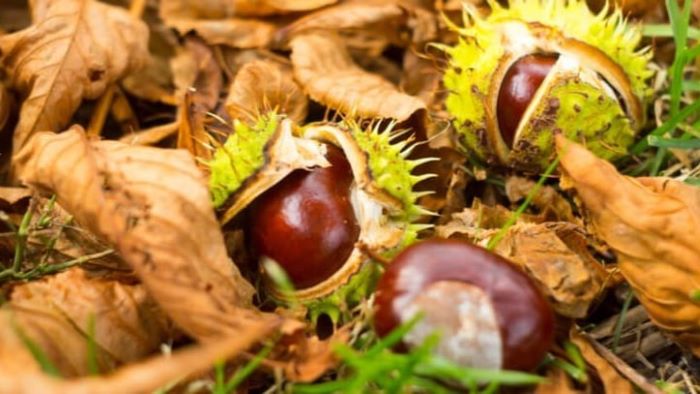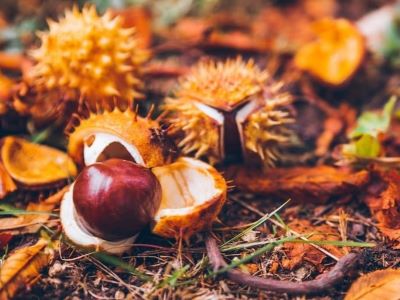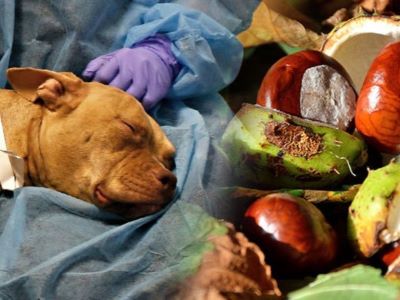Conkers are the large brown seed pods that fall from horse chestnut trees. They have a glossy appearance to them and the kids enjoy collecting conkers and eating them often. This indirectly points out concerns for our pets questioning “Are Conkers Poisonous to Dogs?“.
Conkers contain toxic compounds and even small ingestions can cause poisoning in dogs. Let’s understand the dangers of this seedling, so it can help dog owners prevent conker toxicity.

What are conkers?
Conkers are the nut-like seeds contained within the spiny green casings produced by horse chestnut trees (Aesculus hippocastanum). Horse chestnut trees are large, deciduous trees native to the Balkan Peninsula but commonly planted for ornamental purposes in parks and gardens throughout Europe and North America.[1]

The trees produce conkers in late summer, which then fall to the ground in autumn. Children often collect the fallen conkers to play the traditional schoolyard game conkers, in which players take turns smashing their conkers together to see whose remains intact the longest.
So while the terms conker and horse chestnut are sometimes used interchangeably, technically the conker refers specifically to the brown seed found within the outer horse chestnut casing.
How poisonous are conkers?
Only a few conkers can potentially cause toxicity in dogs. As little as 2-3 conkers broken open and consumed can cause symptoms. Estimates suggest around 10 grams of horse chestnut nut or seed material per kilogram of the dog’s body weight can result in poisoning.
So for a medium 30 kg dog, ingesting 300 grams or around 10 conkers may be enough to make them sick. Smaller dogs usually need to eat fewer conkers to develop symptoms.
It’s also possible for dogs to gradually develop toxicity through lower-level exposure over time. So even just licking or nibbling on a couple of conkers periodically can eventually lead to poisoning.

What is the toxin in conkers?
The toxin compounds found in horse chestnuts can poison dogs are aesculin and saponins.
Aesculin is found in the highest concentrations in the nut or seed portion, though it is present in lower amounts in the leaves, bark, and stems as well. This compound can cause stomach upset, vomiting, and diarrhoea when ingested. Saponins are bitter-tasting glycosides that also have hemolytic properties, meaning they can rupture red blood cells. Saponins can cause vomiting, diarrhoea, and abdominal pain. They can also damage the kidneys.
Symptoms of conker poisoning in dogs
Some symptoms of conker poisoning that can be figured out early may include[2]:
- Excessive drooling – The bitterness of saponins causes profuse drooling.
- Vomiting – Usually occurs within 1-6 hours of ingestion.
- Diarrhea – May be bloody or contain mucus.
- Abdominal pain – The dog may cry, whine, or act tender when the stomach area is touched.
- Loss of Appetite – Not wanting to eat normal food.

What are the signs of conker poisoning?
Some signs of conker poisoning are here as follows:
- Weakness, tremors, or uncoordinated movements
- Increased heart rate and breathing rate
- Fever
- Dark or bloody urine
Kidney damage is also possible, which may not show obvious initial symptoms.
When should you contact a vet?
If a dog eats any part of a horse chestnut, immediate veterinary care is recommended. Quick treatment greatly improves the prognosis and can prevent serious kidney injury.
Don’t wait for symptoms to develop before contacting your vet. Seek advice as soon as you know or suspect your dog has ingested part of a conker or horse chestnut tree.
Take the conker with you if possible when you go to the vet, as identifying the substance can aid diagnosis and treatment.
Treatment of conker poisoning in dogs

Treatment focuses on removing unabsorbed toxins still in the digestive tract, providing supporting care, and protecting the kidneys from further damage.
- Inducing Vomiting – If ingestion was recent, within the last 2 hours. This removes any conker material still in the stomach.
- Activated charcoal – Administered by mouth or through a tube into the stomach. Charcoal binds to toxins in the GI tract to prevent absorption into the bloodstream.
- IV fluids – Helps prevent kidney damage by flushing toxins out of the body and preventing dehydration.
- Anti-nausea medication – To control vomiting.
- Kidney function monitoring – With bloodwork and urine tests to watch for kidney injury. Treatment may include kidney protectants or dialysis in severe cases.
- Supportive care – Keeping the dog comfortable with medications for pain, nausea, and fever as needed.
Dogs are carefully monitored in the hospital for at least 24 hours after suspected conker ingestion to provide prompt treatment for any developing kidney issues or other complications of toxicity.
Prevention

Here are some tips for keeping your dog safe from conker poisoning:
- Avoid walking dogs near horse chestnut trees when conkers are falling in autumn. Don’t allow them to sniff, lick or eat fallen conkers.
- Pick up any conkers that fall in your garden or yard and dispose of them securely in the trash. Check your property regularly.
- Train your dog to “leave it” concerning plants, seeds, nuts and unknown items during walks to discourage scavenging. Always keep them leashed and supervised outside.
- Trim overhanging branches of horse chestnut trees to prevent access. Block fencing holes so dogs can’t get to neighbouring trees.
- Contact your local council about getting horse chestnut trees near playgrounds or walking routes pruned or removed, if feasible. Their fallen conkers can endanger both kids and dogs.
FAQs
Are conkers poisonous to dogs?
Yes, conkers contain toxic compounds called aesculin and saponins that can cause vomiting, diarrhoea, and kidney damage in dogs if ingested. All parts of the horse chestnut tree, including the seeds (conkers), leaves, bark, and stems, are poisonous.
How many conkers would it take to poison my dog?
Only 2-3 conkers could potentially cause toxicity. Around 10 grams of the conker seed per kg of a dog’s weight is estimated to cause poisoning. Small dogs need to eat fewer conkers than large dogs for poisoning to occur.
How many conkers would it take to poison my dog?
Only 2-3 conkers could potentially cause toxicity. Around 10 grams of the conker seed per kg of a dog’s weight is estimated to cause poisoning. Small dogs need to eat fewer conkers than large dogs for poisoning to occur.
What should I do if my dog eats part of a conker?
Seek veterinary care immediately if you know or suspect your dog has eaten any part of a horse chestnut or conker. Quick treatment is vital to prevent poisoning and permanent kidney damage.
How is conker poisoning treated in my dog?
Vets may induce vomiting if recently ingested, provide IV fluids to support kidney function, administer activated charcoal to prevent further toxin absorption, five medications to control vomiting and pain and monitor kidney function with bloodwork.
Conclusion
Conkers may seem like a harmless autumn novelty, but these bitter seeds pose a serious poisoning threat for our pets. Their glossy appearance and association with a favourite schoolyard game can lead both kids and dogs to curiously pop them in their mouths. However, even a few conkers can cause toxic reactions in dogs.
The takeaway from your question “Are conkers poisonous to our dogs” is clear – conkers and horse chestnuts are dangerous and all parts of these trees should be kept trees on walks or in your backyard. Prompt veterinary treatment is essential if poisoning occurs, as the toxins can rapidly cause kidney injury.
References:
- Are conkers poisonous to dogs? | The Kennel Club
- Róisín Bolger (Veterinary Surgeon MRCVS) | Blue Cross



